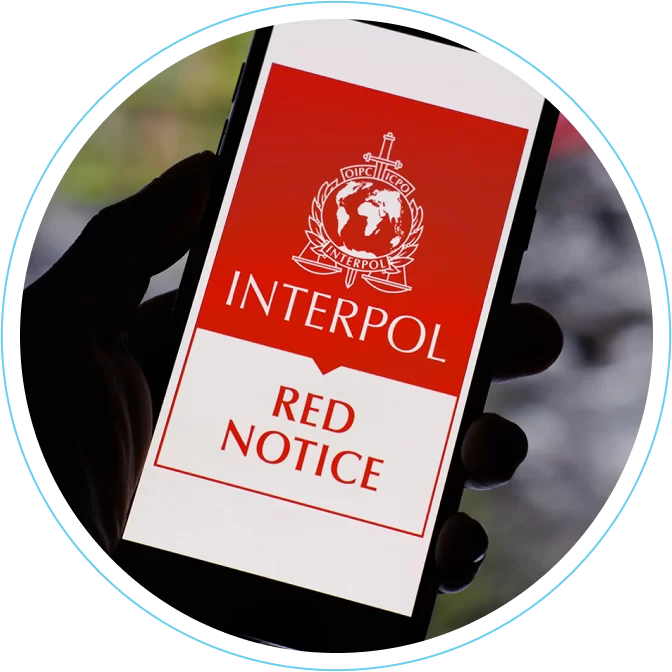
A preventive inquiry to Interpol serves as one of the key tools for protecting the rights of individuals who fear the potential use of a "Red Notice" or another Interpol notice against them. Such inquiries are becoming increasingly important in the context of growing globalisation and the expansion of jurisdiction among international law enforcement agencies. A preventive inquiry allows an individual check if there is a noticecheck if there is a notice from Interpol against them, as well as to take steps to prevent their possible inclusion in the database of this organisation.
A preventive inquiry to Interpol is an official request made by an individual or their Interpol solicitor with the aim of obtaining information regarding the existence or absence of a notice (for example, a red notice ) concerning that individual. This request may also include a plea for such notices not to be issued if they do not comply with Interpol's rules and standards.
Any individual who suspects that remove Interpol red notice may be issued against them can submit a preventive request to Interpol. This can be done by the person themselves or their legal representative, including a solicitor. The primary aim of such a request is to prevent the unjust inclusion of the individual in Interpol's database, which could lead to an international arrest warrant and restrict their freedom of movement.
Interpol preventive request allows an individual to proactively approach Interpol to check for the existence or potential issuance of a Red Notice, as well as to provide evidence proving the unwarranted nature of any possible notice. This is particularly relevant in cases where an individual fears politically motivated persecution or other improper use of Interpol's mechanisms.
Thus, a preventive request can become an effective means of protecting human rights, reducing the risk of arbitrary restriction of freedom and ensuring compliance with international legal standards within the framework of Interpol's activities.
The process of submitting INTERPOL preventive request to Interpol requires meticulous preparation and adherence to all formal requirements. The primary step involves preparing a letter of request, which must be sent to the Interpol General Secretariat located in Lyon, France.
In the letter of enquiry, the grounds for the request must be clearly set out, along with arguments substantiating the illegality or lack of justification for issuing a notice concerning a specific individual. It is important to note that this process requires professional legal support, as not all enquiries may be accepted for consideration.
To submit a request, the individual must:
Thus, a preventive request to Interpol serves as a potent legal tool at any stage, yet its effectiveness directly depends on the professionalism and experience of legal representatives, as well as on meticulous preparation and the gathering of necessary documents.
When submitting an Interpol pre-emptive request, it is necessary to provide a specific set of data and documents. The main ones include:
All these documents must be provided in their original form or as notarially certified copies, translated into Interpol's official languages — English or French.
The Commission for the Control of INTERPOL's Files (CCF) plays a pivotal role in the process of reviewing Interpol pre-emptive requests. The CCF is an independent body responsible for overseeing the adherence to human rights and legality within INTERPOL's operations. Its primary task is to ensure that all notices and requests comply with INTERPOL's rules and regulations, as well as international human rights standards.
When a preventive request is received by Interpol, the CCF reviews it for compliance with the organisation's charter and rules. If the CCF deems that the request meets the requirements, it can initiate the process to prevent the issuance of a Red Notice. Should a Red Notice already exist, the CCF may recommend its cancellation.
A key function of the CCF is also to consider complaints from individuals who believe their rights have been violated in connection with an Interpol notice. This can include instances where the notice was issued on the basis of politically motivated charges, which contravenes Interpol's rules.
Despite the importance and relevance of preventive request, the CCF may reject them in certain cases. The main reasons for rejecting a Interpol pre-emptive request can include:
The process of reviewing a preventive request to Interpol can take several months, during which time the applicant and their solicitor may need to provide additional documents and evidence. It's important to understand that even if the request is denied, the applicant has the right to reapply or appeal.
Thus, a preventive request to Interpol is a powerful legal tool that can assist individuals in protecting their rights on the international stage. However, its effectiveness directly depends on the professionalism and experience of legal representatives, as well as on thorough preparation and the collection of necessary documents.
Preventive request is essential for individuals who believe they may be at risk of being the subject of an Interpol notice. Specialized Interpol lawyers provide expert assistance to preemptively safeguard rights and address potential issues that could arise within the Interpol information system. Here’s how these legal professionals can assist with preventive requests: